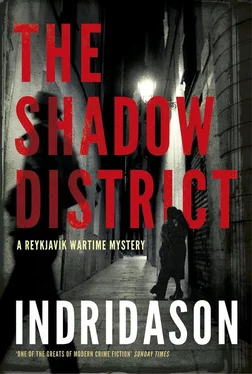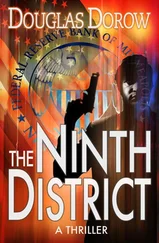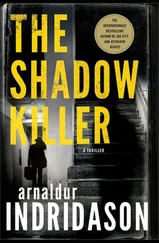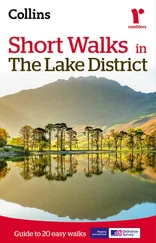‘Just above here is Glymur, the highest waterfall in the country,’ he commented as they stood by the bridge over the River Botnsá at the head of the fjord. ‘You ought to walk up there sometime. It’s a pleasant hike — easy, not too far.’
‘How come some Icelanders don’t want to break with Denmark?’ asked Thorson suddenly, as he leant over the rail. ‘Isn’t it about time?’
‘I think everyone wants independence really,’ said Flóvent. ‘But some feel the timing’s not right. The Danes are vulnerable because they’ve got their hands full with Hitler, so there are those who think we should postpone our declaration. They don’t want to offend the King.’
‘Does his opinion still matter to people here?’
‘Not to me,’ said Flóvent.
Thorson was aware that the inauguration of the republic that summer would mark the end of almost six hundred years of Danish rule. The struggle for independence in the last century and the start of this one had reduced Denmark’s influence in Iceland, but the two nations had to be formally separated before the process could be completed. The Republic of Iceland was to be established at the ancient assembly site of Thingvellir on 17 June, the anniversary of the independence hero Jón Sigurdsson’s birth.
‘What’s worse,’ said Flóvent, once they were seated in the jeep again, ‘is the talk of the American army staying on once the war’s over.’
‘Wouldn’t that be a good thing?’ asked Thorson. ‘Don’t you need military protection? It’s not like you have an army of your own.’
‘What we need is neutrality,’ said Flóvent, as they set off again. ‘We’ve no business having an army.’
‘Is neutrality really feasible? I mean, would you want to be neutral in this war?’
‘Others have managed it.’
‘Are you saying you’re just swapping the Danes for the Americans?’
‘Honestly, I don’t know. These are strange times.’
They were stopped at a checkpoint when they reached the military zone, but were waved through after Thorson flashed his police badge. Rósamunda’s brothers both worked at the depots and Thorson had phoned ahead to request the assistance of the officer in charge, one Colonel Stone. The colonel had spoken in turn to the man in charge of the Icelandic contractors who had passed on the message to his men. When Flóvent and Thorson arrived, the brothers were waiting for them in the overseer’s office. British and American destroyers lay at anchor in the fjord and a large oil tanker was taking on fuel to supply the fleet out at sea. Dense ranks of Quonset huts, with their curved green roofs and pairs of windows at each end, ran up the slopes from the shore, housing dormitories, offices and stores, while the giant oil tanks loomed over them all.
The brothers were both in their early twenties, one dark, the other red-haired, both lean, though one was appreciably stockier. His name was Jakob, he was the more self-assured of the two and did the talking. Egill was a bit younger and had little to say for himself, seeming shy and withdrawn in his brother’s presence. Both were dressed in khaki trousers, black military boots and hand-knitted lopapeysur instead of jackets. All they had been told was that the police wanted to talk to them about their sister.
‘Are we under arrest?’ asked Jakob.
‘No,’ said Flóvent. ‘Of course not. Is that what you were told?’
‘That’s what everyone will assume,’ said Jakob.
‘We just wanted some information from you. That’s all.’
‘Should we talk to them individually?’ Thorson asked Flóvent.
‘Why?’ asked Jakob immediately.
‘We can start with you,’ said Flóvent. ‘If you’d wait outside, Egill, thank you.’
Egill looked at his brother, who gave him a sign to do as he was told. Once he had left the room, they sat down and Jakob pulled out a packet of American cigarettes and offered them round. They declined. He lit up with a new American Zippo lighter, flipping back the lid with a loud snap.
‘Did your family up north have a good relationship with Rósamunda?’ asked Flóvent. ‘Did you stay in touch with her while you were growing up?’
‘Not really,’ said Jakob, expelling smoke.
‘Why not?’ asked Thorson.
‘She was given up for adoption. We didn’t talk about her much. Me and Egill were sent away for several years too. Life was tough at home.’
‘But she was your sister.’
‘So? It’s not like we knew her at all. I don’t remember her. Nor does Egill. So there’s no point asking us about her.’
‘What do you think happened to Rósamunda?’ asked Flóvent.
Jakob shook his head. ‘Dunno. There’s plenty of stuff going on in Reykjavík with all those soldiers around.’ He looked pointedly at Thorson.
‘Do you think she could have been mixing with the soldiers?’
‘Haven’t a clue. I didn’t know her.’
‘When did you last see your sister?’
‘I already told you: I don’t remember her. Neither does Egill.’
‘We gather she was corresponding with her father — your father. Were you aware of that?’
‘She wrote to the old man,’ said Jakob. ‘Said she was planning to visit us. But nothing came of it.’
‘Do you know why she got in touch?’ asked Thorson.
‘No.’
‘Maybe she wanted to get to know her family?’
‘Maybe.’
‘Didn’t you have any interest in meeting her?’
Jakob thought, then shook his head.
‘Do you know if she was happy with her adoptive parents?’
‘No. Haven’t a clue.’
‘Whether she wanted to leave them? Move home to be with your father? Was that why she wrote to him?’
‘Dad didn’t mention anything like that. There was only the one letter. He told her she’d be welcome up north.’
They persevered with their questions, but Jakob seemed remarkably indifferent to his sister’s fate. His callousness didn’t escape them.
‘Doesn’t she matter to you at all?’ asked Thorson.
‘I didn’t know her.’
‘She was your sister,’ said Flóvent.
‘She probably had a much easier life than us. I can’t think why she wanted to get in touch.’
‘To get to know you? Her family?’
‘Yeah, well, nothing came of it.’
‘It seems likely that she was raped.’
Jakob’s expression didn’t change.
Flóvent asked if he had been in Reykjavík the evening Rósamunda’s body was found, but he said no. He and his brother had been here in Hvalfjördur as usual. They’d worked all day, then played poker with some Yanks in a hut that served as a bar.
Jakob’s younger brother Egill was not as offhand with them. He took the chair facing them, sniffed loudly and wiped his nose on the sleeve of his jumper. They asked him many of the same questions as they had put to his brother, and he backed up Jakob’s statement that they had been in Hvalfjördur when Rósamunda died.
‘When did you last see your sister?’ asked Flóvent.
‘I don’t remember,’ said Egill. ‘I was so young when she was adopted.’
‘Was there no contact at all between your family and Rósamunda in Reykjavík?’
‘No.’
‘Never?’
Egill shook his head. ‘Well, she wrote to Dad.’
‘Did you see the letter?’
‘No, he told us.’
‘What was her letter about?’
‘She wanted to meet us or something.’
‘Was your father in contact at all with the couple who adopted Rósamunda?’
‘No. Never. We were...’
‘What?’
‘We were told it was best for everyone if there was no contact. She was theirs and that was that. We always knew we had a sister in Reykjavík. We knew what had happened — she had to be given away. Dad couldn’t look after all of us when Mum died. Me and Jakob were sent to other farms. The family was split up. That’s nothing new.’
Читать дальше












